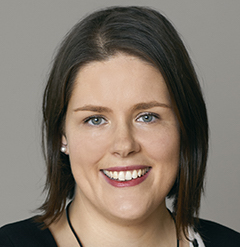
Rebecca Marshall is a perfect example of how diversity in the workforce can help us deliver successful offshore wind projects and contribute to achieving society’s net zero ambitions.
When she’s not spending time in nature with her two children, Rebecca works as Environment and Consents Manager at Copenhagen Offshore Partners. In this role she also serves as Consents Coordinator for the Pentland Floating Offshore Wind Farm. The Pentland Floating Offshore Wind Farm will be the largest of its kind once complete.
To mark International Women’s Day, we caught up with Rebecca to learn more about her career to date, her thoughts on how COP ‘Embraces Equity’ and how we can encourage more women and girls to pursue careers in offshore wind.
How did your renewable energy career journey begin?
As a child, I’d always dreamed of becoming a lawyer but took a different path than others in the legal field.
I started by studying a law degree and an arts degree, with a specialisation in physical geography. As an Australian, I’ve always loved spending time at the beach so studying waves and beach dynamics was a real highlight.
After I completed my legal training, I was interested in a career that would allow me to work internationally, so I joined the Australian Department of Foreign Affairs and Trade. There I worked across a number of foreign and trade policy issues including international climate change policy. In 2014, I was posted to Copenhagen as a diplomat and spent three years in the Australian embassy in Denmark.
I enjoyed life in Denmark so much that after my posting, I decided to stay and complete a Masters of Science in Climate Change, focusing on the integrations between science and society. It was during this time that I joined the Copenhagen Offshore Partners team.
Tell us about your role at COP.
The permitting and consents team ensures that the environmental and social impacts of the project are assessed; stakeholders and the local community have been consulted; and that the project has all the necessary permits in order to build and operate the wind farm. This is important as the project cannot move forward without these permits being in place. As Consents Coordinator, I support a range of initiatives to obtain key consents for the Pentland project. These include assisting the coordination of Environmental Impact Assessments (EIA) for offshore and onshore permits and licenses, preparing permitting documentation and coordinating stakeholder engagement.
What has been particularly interesting about this role is that I’ve been able to leverage skills and knowledge from my legal studies and jobs outside of the offshore wind industry. For example, I utilise my legal skills when reviewing legislation and contracts and draw on my scientific background when reviewing the latest environmental research.
Why did you choose a career in offshore wind?
I wanted to be involved in projects that address some of the key challenges around climate change. Floating offshore wind is poised to play a significant role to reach net zero and that is very motivating.
Pentland, in particular, is an exciting project due to the cutting-edge technology it aims to deploy. I’ve enjoyed the challenge of identifying how floating projects differ from fixed when assessing potential environmental impacts and working on consents for one of the largest floating projects in the world.
What do you think the key challenges will be for the future of floating wind?
There are huge ambitions for floating offshore wind deployment. However, due to the volume and scale of projects being developed, consenting processes may become a stumbling block without adequate resources in place to keep up with demand.
It’s also vital that we encourage more talent to join the industry.
Do you have any thoughts on how we can encourage more women and girls to pursue a career in energy?
Having a greater representation of women will be vital to achieve the ambitions of the energy industry. Diverse teams make better decisions and can therefore, deliver more successful projects, because of the different perspectives they bring.
It's important to show the range of roles available in the industry as well as the diversity of backgrounds and educational experience. My career path has been very different from my colleagues, but there are strengths to having a team with a range of experience and skill sets.
The theme of this year’s International Women’s Day is “Embrace Equity” – how do you feel Copenhagen Offshore Partners demonstrates this?
COP has a real focus on increasing representation of women, both in the company and the industry more broadly. I’m involved in COP’s diversity and inclusion network which aims to attract more diverse candidates and support them during their career with the company. I am grateful to have both male and female mentors who have supported me in my role, and it’s rewarding to do the same for others.
What would be your advice to women and girls looking to pursue a career in offshore wind?
I’m fortunate to have a job I’m passionate about, where I learn something new every day. I would encourage others to find something that you feel makes a difference to the world – that’s what inspires and motivates me in my role.


